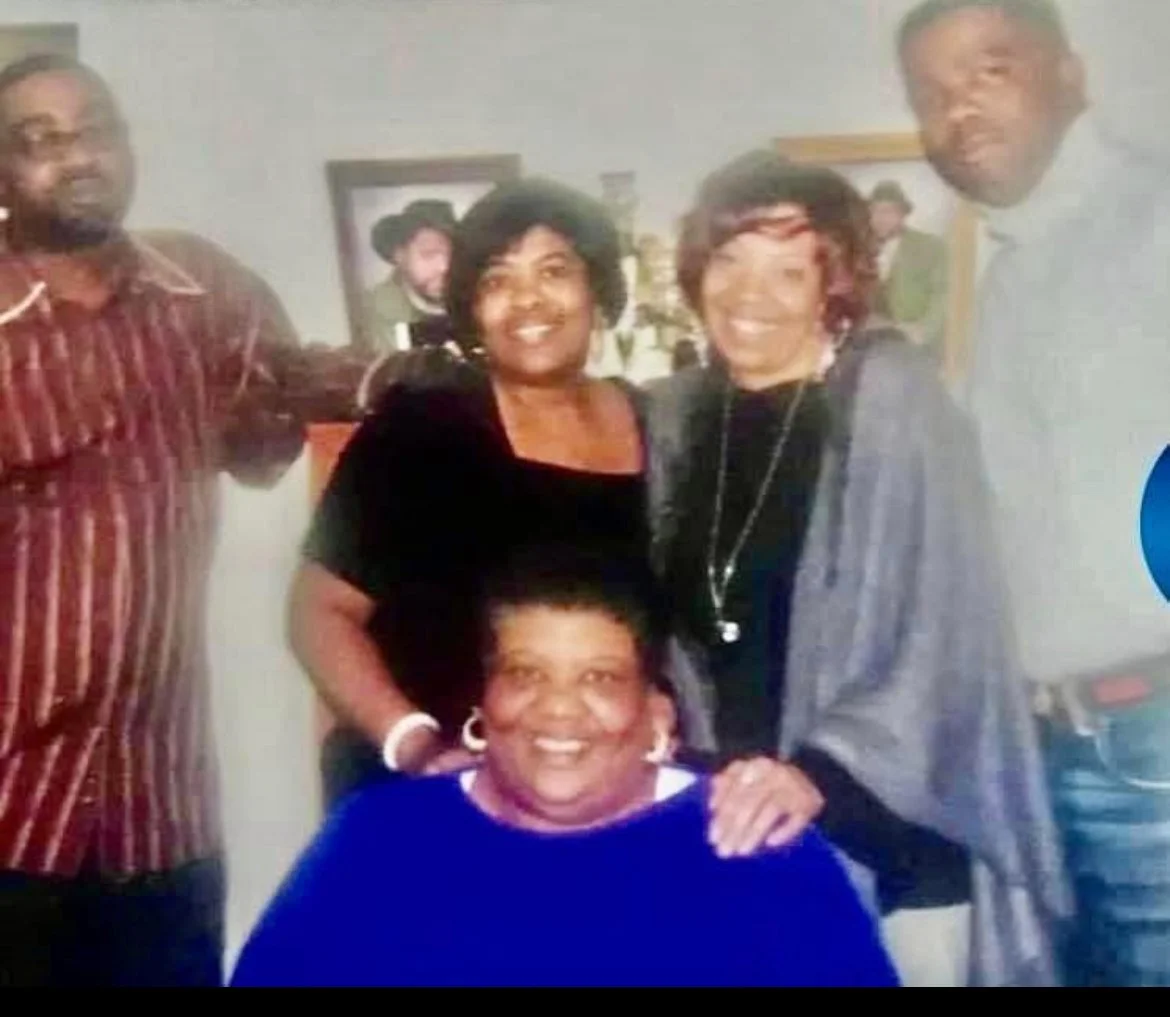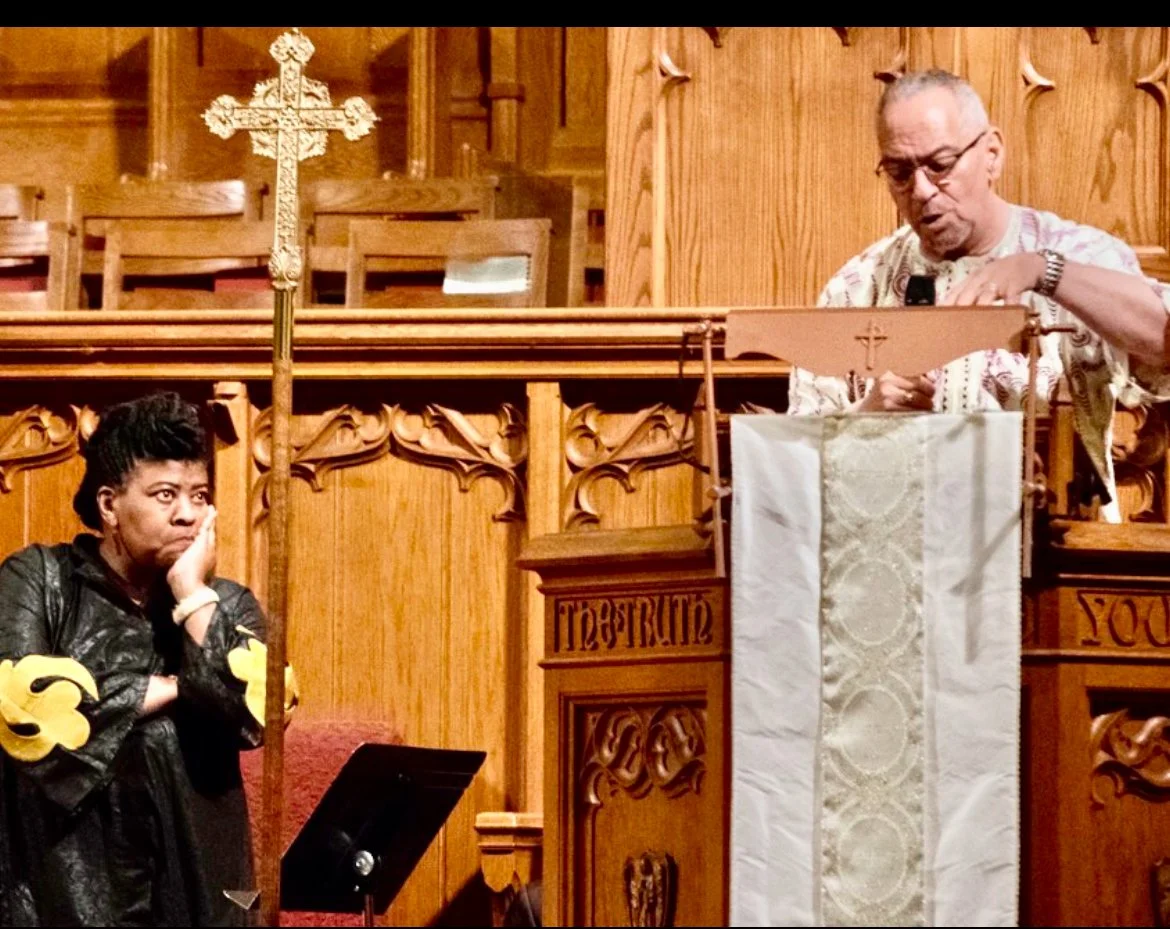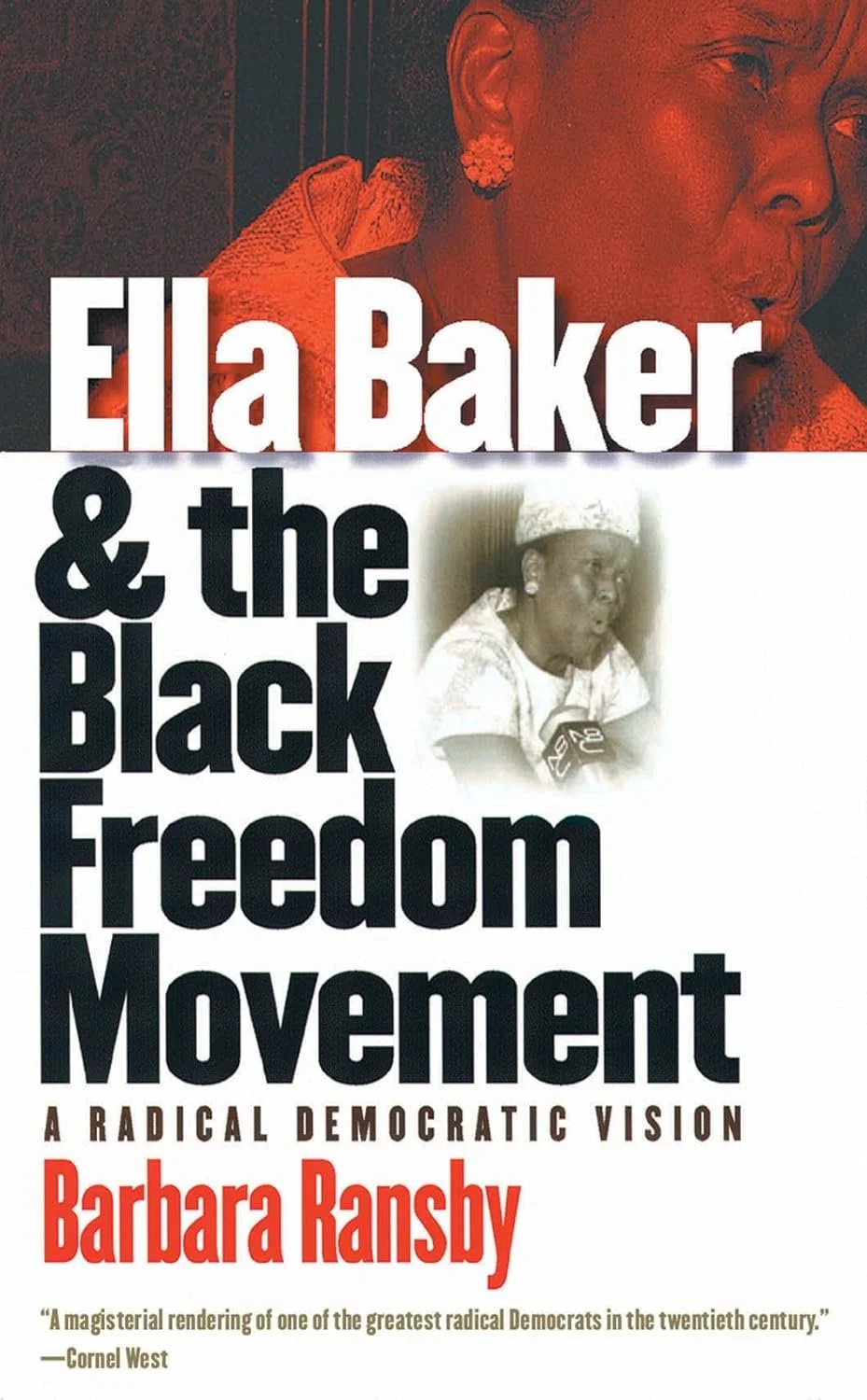Lessons from Unsung Heroes
Rev. Dr. Gould, Rev. Dr. Jeremiah Wright, Jr. and other renowned preachers, teachers, activists, and community leaders.
This morning, Dr. Gould flew into Washington, D.C., and her travels were derailed by the tragic plane and helicopter crash. As you read this reflection, please pray for her (and all of those impacted) as she processes the weight of this moment, shaken by the realization that it could have been her. We stand with her in gratitude and solidarity as she continues to be a powerful voice for justice.
Pastor in the Public Square and Managing Director of Power Building at Faith in Action, the Rev. Dr. Cassandra Gould, is a public theologian, pastor, and organizer with over 30 years of experience integrating biblical justice into activism. As an ordained elder in the African Methodist Episcopal Church and a national advocate against financial predation, Dr. Gould has been instrumental in bridging the gap between the church and the streets. Her mentorship and coaching helped us birth BLK South, and we are honored to have her on our board. We are honored to have her join the BLK South Board of Advisors.
Over the last few weeks I have found myself grappling with what it means to live with an autocratic government, operating under a fraudulent veneer of democracy. My weary spirt has been renewed by revisiting the work of Black cultural icons, heroes and sheroes whose legendary images, speeches, quotes and acts of disruption are rightfully acknowledged, celebrated, quoted and have become a source of content for motivating memes. This includes some of the legendary figures of the Civil Rights Movement of the 1950s and 1960s: Rev. Dr. Martin Luther King Jr., Rosa Parks, Fannie Lou Hammer and Malcolm X to name a few. These now historic figures were undeniably essential in helping us to realize a many of the freedoms and rights that are currently under attack. Malcom, Martin, and others paid the ultimate price for daring to disrupt systems designed to plunder the many and profit the few. For the record, neither of them were fully regarded as heroes during their brief lives. They both worked tirelessly for freedom and deserve a deep level of respect. They were not alone.
Countless other unsung individuals played pivotal and often overlooked roles in advancing civil rights. These undervalued heroes were faith leaders, grassroots organizers, legal advocates, students, and ordinary citizens who risked their lives and livelihoods to transform the world. Their contributions not only shaped history but continue to hold critical lessons for today's ongoing struggles for justice and equity.
As a daughter of the South and a person born near the end of the Civil Rights era, while I was aware of fictional heroes including: Batman, Superman, Aquaman and my childhood favorite favorite Wonderwoman in my home state of Alabama I was shaped by the many stories of ordinary people making extraordinary sacrifices to transform their communities and the nation. One such hero is Diane Nash, a key strategist for the Student Nonviolent Coordinating Committee (SNCC) and a leader in the Freedom Rides. Her courage and determination helped dismantle segregation in interstate travel. Despite being arrested multiple times and facing harassment, Nash remained steadfast in her commitment to nonviolence and civil disobedience.
The wisdom of another unsung shero Ella Baker has been a guiding force for me since I formally entered into community organizing over a decade ago. Ms. Baker was a community organizer and one the most influential yet under-recognized leaders of the Civil Rights Movement. She practiced and taught the power of grassroots organizing, activism and community led change. As an advisor to the SNCC and a co-founder of the SCLC, Baker was a tireless advocate for empowering young people and ordinary citizens to lead their own movements. Her philosophy of participatory democracy inspired countless activists and continues to inform organizing and social justice movements.
Rev. Dr. Gould pictured with her siblings and late mother, Carrie Thelma Gould Jefferson.
I cannot name these unsung heroes and sheroes without naming my mother the late Carrie Thelma Gould Jefferson who along with my beloved Aunt Bessie Brown fought for voting rights in Alabama in the 1960's. They traveled the 49 miles one way from our home town of Demopolis to get to Selma to ensure that when their children were old enough to vote that we could do so without any obstacles. Bessie once told me, "When your mama said we were going to a meeting, we never knew if we were going to make it home!" Yet they went anyway. Mom left this earth with a gash on her leg that she sustained in Selma on Bloody Sunday. She was willing to sacrifice her body for a better life for her progeny and the community. As my family members often remind me, I get it from my mama!
Long before I was a pastor my faith formation was shaped by the prophetic Black Church tradition. I grew up Baptist and as an adult became a member of the African Methodist Episcopal Church. It is the church that I continue to serve as a minister of the gospel. So I would be remiss if I didn’t acknowledge a few faith leaders who are also heroes and sheroes. I am especially informed by holy disruptors, who dare to speak truth to power internally and externally and to disrupt systems. Dr. King was of that lineage, but a lesser celebrated hero was the Reverend Fred Shuttlesworth, a prophetic pastor and co-founder of the Southern Christian Leadership Conference (SCLC). Despite numerous attempts on his life, including the bombing of his home, he relentlessly fought for desegregation in Birmingham, Alabama, one of the most violently segregated cities in America. His courage along with others laid the groundwork for the Birmingham Campaign of 1963, which became a turning point in the Civil Rights Movement. While I did not know him personally I beam with pride every time I fly into Birmingham and land at the Shuttlesworth Airport, which was named as a tribute to him.
It was my late uncle, the Reverend Clyde Fluker, a Baptist pastor in Birmingham, who introduced me to his colleague Rev. Shuttlesworth by sharing stories of his bravery. I recently learned after preaching a sermon in Birmingham and quoting my uncle, that he too was a holy disrupter. After I preached, an eager 70 year old woman came forth and shared with me that she registered to vote because of Uncle Clyde. Her mother had recounted that before the Voting Rights Act of 1965 was passed and Black people were subjected to poll taxes my uncle who took the written test that was used to bar Black people from registering to vote and made sure community members knew the answers. He would teach them and regularly quiz them. On her 18th birthday her mother took her to register because she was inspired by my uncle.
Rev. Dr. Gould sitting under the tutelage of Rev. Dr. Jeremiah Wright.
As a trained community organizer and pastor in the public square my call has afforded me to learn from and with many faith leaders who are committed to justice for all of GOD’s children. In the spirit of giving people their flowers while they are living, two living legends who have shared their wisdom and inspired many are the Reverend Dr. Jeremiah Wright Jr., Pastor Emeritus of Trinity UCC Chicago, and the Reverend Dr. Terese Fry Brown, Retired General Officer of the A.M.E. Church and Associate Dean of Academic Affairs and the Bandy Professor of Preaching at Candler School of Theology at Emory University. Both are scholars, authors and peerless proclaimers of the Gospel. Early in my ministry when I was searching for contemporary examples of those who were unashamedly Black, Christian, prophetic and engaged not merely in the proclamation of prophetic ministry but also in the praxis of it Dr. Wright who was then the Sr. Pastor of Trinity UCC Chicago was who I studied. The Samuel Dewitt Proctor Conference that he co-founded gave me the opportunity to be in relationship and fellowship with this iconic genius of a preacher. I am grateful that I continue to be able but to glean from his wisdom. His resiliency and his wit are as awe inspiring as his intellect and his preaching. The highest compliment I ever received regarding my ministry was from someone who said, you remind me of Dr. Wright. He bears the scars of what it means to be a prophetic witness in a time of national turmoil but even in retirement continues to be bulwark for justice.
Rev. Dr. Teresa Fry Brown pictured with Rev. Dr. Gould
The Reverend Dr. Teresa Fry Brown’s testimony as a woman in ministry, as articulated in her book, “Can A Sistah Get a Little Help?” kept me in organized religion at a time when I was having an extensional crisis about the Church. I will be forever grateful that she took the time to respond to an inquiry and cry for help from me, a stranger trying to find her way in the complex journey of ministry. Her mentorship and guidance has been invaluable over the last couple of decades. She is a barrier breaker who has blazed trails inside and outside of the Church especially for women. At a time when a call to ministry meant an automatic assignment to the Church she knew that the Academy was her primary pulpit and she continues to contribute to the formation of countless people in the Academy and the Church. Each of these heroes and sheroes made a set of decisions about how they would show up in the world and were willing to take personal risk to make the world better for others.
If you will allow me to traverse the annals of history to introduce another unsung and often erased figure in history, whose story matters now as much as it did in the 19th century. Wong Kim Ark, whose landmark 1898 Supreme Court case affirmed birthright citizenship under the 14th Amendment. Wong Kim Ark, born in San Francisco to Chinese immigrant parents, decided to fight for his right to be an American by engaging in a legal battle when he was denied re-entry to the United States after going to China to visit his parents. His victory established that anyone born on U.S. soil, regardless of their parents' nationality, is a U.S. citizen. Even as I write this, the protection of birthright citizenship is risk. His story underscores the need to remain vigilant in defending birthright citizenship for all.
Lessons for Today
The stories of these unsung heroes remind us that meaningful social change is rarely achieved by a few charismatic leaders alone. It is the collective effort of everyday people who challenge injustice and demand accountability from those in power. In today’s world, where racial disparities persist and new forms of discrimination emerge, the courage and strategies of these heroes remain deeply relevant.
Ella Baker, Diane Nash, Fannie Lou Hamer and my mama remind us: there is power in grassroots organizing. In an era where we have confused mobilizing with organizing, we have an opportunity to learn from trained organizers how to build the power we need, not merely to survive this moment in history but to ensure our people thrive. Organizing provides the infrastructure for sustainable transformative movements. Ms. Baker’s “leaderful” approach to organizing is the antithesis of today’s era of solo leaders striving for influencer status and being a voice for the people.
Reverend Shuttlesworth, my beloved uncle Clyde, and mentors Dr. Wright and Dr. Fry Brown remind us of the wisdom and theological imagination of the Black Church and the role and responsibility of faith in social movements writ large. This moment requires prophets and priests. We have to decide: will we be prophets or resistance or honorary pallbearers who ignore the impact of necro-politics on our people?
Another lesson: is the importance of resistance and courage in the face of adversity. We must not be deterred by what we are facing but must still ask: What is possible?
The unsung heroes of the Civil Rights era played an indispensable role in shaping the path toward justice for all. Their courage, determination, and strategic brilliance offer valuable lessons for today’s struggles. There lives and work provide us with valuable lessons and also allow us to draw strength and inspiration to continue the fight for a more just and equitable society. Today’s unsung heroes and sheroes will be the ones who don’t bow at the altar of fascism and division but who dare to live out the call that the prophet shared, in Micah 6:8 “Do justice, love mercy, and walk humbly with God.”
REFLECTION QUESTIONS
Who are the unsung heroes in your life, and what makes them heroic to you? Are there historical figures inspiring you as you seek to make meaning today?
In this moment, what is God calling you to do? How will you respond?
RECOMENDED READING
COMING FEBRUARY 2025









